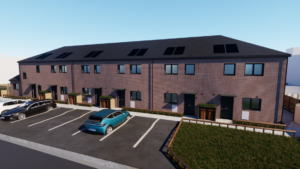Report: giving hope to Manchester’s growing homeless population

Manchester is famous for being the home of the industrial revolution, two football teams and a rich musical heritage, but it is now increasingly known for the number of homeless people on its streets.
Homelessness in the city rose by 41% in 2017, with the council expecting this to rise by 60% over the next three years.
The Mustard Tree is a charity who have provided support services to Manchester’s homeless for the past 25 years.
NewStart recently took a tour of their newly refurbished building in Ancoats and met with Aileen Stirman, their head of fundraising.
‘We exist so they can gain the skills and self-confidence to get back into society,’ says Aileen.
‘We’re a community of hope and aspiration and we equip people with the skills and confidence they need to find work.
‘If they are not able to work then we want to help improve their financial capability and accommodation so they have a better of quality of life,’ she adds.
People are referred to The Mustard Tree from social services, the police, the council and as well as other charities. But due to their presence and reputation in the city, 70% of their clients self-refer.
They have three community hubs in Ancoats, Eccles & Little Hulton, with all centres featuring a second-hand furniture and clothing store to help with fundraising as well as being a place where clients can volunteer and re-skill.
Aileen says when someone walks through their door, it’s important to open an authentic dialogue.
‘We are entirely person-centred,’ she says.
‘It’s a conversation and they are being listened to for the first time in a very long time.’
The Homelessness Charter

A homelessness protest in Manchester, 2015.
The reasons for homelessness are complex with addiction, poverty, family breakdown and a lack of affordable housing all contributing.
According to Manchester City Council, 278 people were sleeping rough in the city in 2017.
However, there are hundreds of people sofa surfing and hundreds more staying in bed and breakfast accommodation.
Andy Burnham, who was elected Mayor of Greater Manchester in May 2017, says tackling homelessness is one of his main priorities.
He donates 15% of his mayoral salary to homeless charities and made a campaign promise to end rough sleeping in the region by 2020.
That’s looking increasingly ambitious, but his interventions have been welcomed by The Mustard Tree and other charities in the city.
‘Having any kind of energy and passion behind an issue is really important,’ says Aileen.
‘His focus on the issue has helped to galvanise different sectors.
‘He’s bringing the business, charity and statutory services communities together. ‘
As well as launching the Manchester Homelessness Charter, Burnham has helped push forward a £1.8m scheme that offers homeless people a home in one of Greater Manchester’s housing providers.
It’s a positive step, but due to massive budget cuts, the council is often unable to treat the root causes of homelessness.
Voluntary crisis organisation, Lifeshare estimates that 95% of Manchester’s homeless are using the drug spice.
With not enough support available to addicts, it’s become a perfect storm.
‘If you cut any business by that in such a period of time, that would close the business. You can’t be surprised.’
‘People with addiction and mental health issues are rough sleeping.
‘You might have had a lot of support workers [at supported accomodation] in the past, now you have just a security guard. People will fall through the cracks,’ says Aileen.
With social and supported housing limited, the only other option is often the private rental market.
However, gentrification and rising rents have made the city centre unlivable for those in desperate need of a place to live, which is exacerbating the homelessness crisis.
The Guardian reported earlier this year that in central Manchester monthly rents have increased on average by more than £100 year on year.
The same article noted of the almost 15,000 homes granted planning permission by the council’s planning committee in the last two years, not one is set to be ‘affordable.’
Upskilling

An IT lesson at The Mustard Tree.
Key to The Mustard Tree’s ethos is boosting skills.
Their name comes from a parable from Marks Gospel, which says from the smallest of seeds grows the largest tree.
‘If you have a tiny bit of hope we will nurture that and help it flourish or grow,’ says Aileen.
They offer structured programmes aimed at building resilience and upskilling people to get out of their situation rather than sustaining people where they are.
Their Freedom Project is a volunteering programme set over two days a week, where a client chooses a training scheme that suits them.
They might work in the furniture shop or train in the kitchen whilst taking advantage of courses in IT, customer service or food hygiene.
They also have art, music and theatre studios at their Ancoats hub.
‘We want to serve the whole person,’ says Aileen.
‘However low you are, you still have something to contribute. They deserve dignity and for someone to see that they are a person of value.
‘This is much more transformational than handing out a food parcel. This is where change happens.’
There are also support workers on hand who are trained in advanced motivational interviewing, which is similar to cognitive behavioural therapy (CBT).
Aileen says the whole package is about training people’s brains to be much more resilient so they can make better decisions in their lives.
‘Giving people that feeling of safety allows people to relax and start to be able to plan for the future, which you can’t do in a point of chaos.’
Aileen tells me about a client called Anthony who came to The Mustard Tree in his 40s.
‘He couldn’t make eye contact with anybody and wore baseball caps all the time,’ she says.
When he was a teenager he dabbled in drugs, his girlfriend got pregnant and had a baby but because of his lifestyle, he wasn’t allowed to see the child.
‘That caused a mental health breakdown, then he got into a cycle of rough sleeping, offending then prison for years,’ says Aileen.
He volunteered with one The Mustard Tree’s work programmes, took his baseball cap off, starting going to art classes and realised he had talent.
‘He’s now married, has a mortgage, is a supervisor at a train company and is in contact with the baby girl he had when he was 17,’
‘The triumph of human spirit over adversity is something I get to see every day here and that’s inspirational.’
Hope springs eternal

Mustard Tree art from a volunteer called Marcus.
With the Manchester Homelessness Charter bringing charities, businesses and organisations together to reduce of people sleeping rough in the city, Aileen is hopeful Manchester is on the right track.
But charities like The Mustard Tree are already stretched, and with winter on its way, it’s clear things are going to get worse before they get better.
‘Begging is a horrific place to be, but Manchester is an incredibly generous community. People want to make a difference and help,’ she adds.
‘Hopefully, we won’t need to exist in 10 years but sadly I can’t see how we won’t be needed.
‘We’d like to do ourselves out of a job!’















